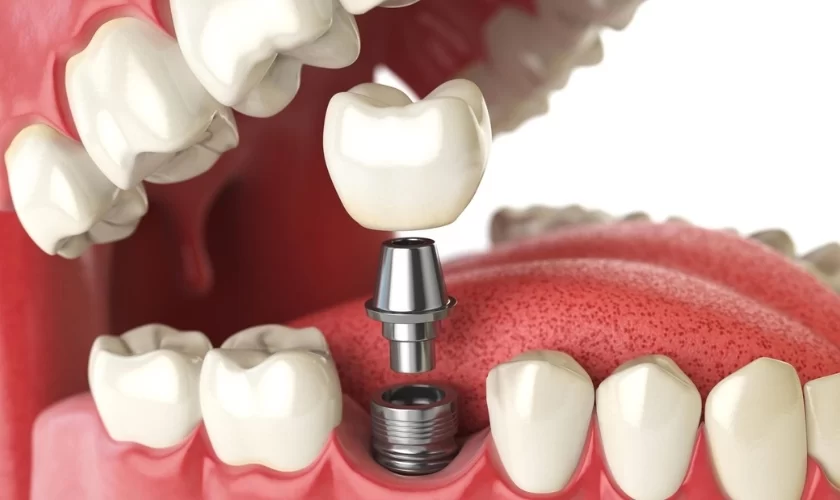
- Understanding Dental Implant Care
- Post-Cleaning Maintenance Steps for Dental Implants
- Common Challenges and Practical Solutions
- Real-Life Case Insights and Expert Tips
- Recommendations for Products and Services
1. Understanding Dental Implant Care
Dental implants have revolutionized restorative dentistry, offering patients a durable and natural-feeling solution for missing teeth. However, caring for these implants after professional cleaning and routine maintenance care requires special attention. Unlike natural teeth, implants integrate with the jawbone but lack the protective periodontal ligament, making proper care critical to avoid complications such as peri-implantitis or implant failure.
Proper dental implant care involves maintaining both the implant surface and surrounding gum tissue in optimal condition. This means regular hygiene routines and professional cleanings tailored specifically for implants. The goal is to prevent bacterial buildup and inflammation that could jeopardize the implant’s stability. Understanding the delicate balance between effective cleaning and avoiding damage to the implant’s surface is essential for long-term success.
1.1 The Role of Professional Maintenance Care
After implant placement, patients enter a maintenance phase where professional care becomes pivotal. Dental hygienists use specialized instruments designed to clean implants gently without scratching the titanium surface. This professional cleaning reduces biofilm accumulation, a common cause of implant-related infections. Regular visits also allow early detection of any issues, enhancing the implant’s longevity.
1.2 Daily Oral Hygiene Practices
Daily oral hygiene complements professional care by controlling plaque around the implant. Effective brushing, flossing, and rinsing remove debris and bacteria before they can damage tissues. Special implant-specific tools like interdental brushes or water flossers can improve cleaning efficiency, especially in hard-to-reach areas.
2. Post-Cleaning Maintenance Steps for Dental Implants
Knowing how to care for dental implants after cleaning and maintenance care is a multi-step process. Each step ensures that implants remain free from infection and maintain their functional integrity over time.
2.1 Immediate Care After Professional Cleaning
Immediately following a professional implant cleaning, patients might experience slight gum sensitivity or mild bleeding. It is important to maintain gentle oral hygiene practices and avoid aggressive brushing in the treated area for 24 to 48 hours. Using a soft-bristle toothbrush and a non-alcoholic antimicrobial mouth rinse can soothe gums and promote healing.
2.2 Long-Term Maintenance Strategies
Long-term care involves consistent daily hygiene, avoiding tobacco use, and monitoring for signs of implant distress such as swelling, bleeding, or discomfort. Incorporating fluoride toothpaste designed for implants and using antiseptic rinses periodically can reduce the risk of bacterial growth. Additionally, patients should maintain routine check-ups at their dental clinic to ensure implants remain healthy.
2.3 Nutrition and Lifestyle Considerations
Nutrition plays a supporting role in implant care. A diet rich in vitamins C and D, calcium, and protein supports gum health and bone density around the implant. Limiting sugary foods and acidic beverages helps reduce plaque accumulation. Avoiding smoking and excessive alcohol consumption is also vital since these habits impair healing and increase infection risk.
3. Common Challenges and Practical Solutions
Even with the best care, dental implant patients sometimes face challenges. Understanding these common issues and their solutions can empower patients to protect their investment.
3.1 Peri-Implantitis Prevention and Management
Peri-implantitis, an inflammatory condition affecting tissues around implants, can lead to implant failure if untreated. Preventing it involves rigorous plaque control and early intervention when symptoms appear. If detected, treatment may require deep cleaning, antibiotics, or surgical intervention. Regular maintenance visits and patient education are crucial in prevention.
3.2 Managing Mechanical Issues
Mechanical problems like loosening of the implant crown or abutment screw may occur. Patients should report any mobility or discomfort promptly. Professional adjustments or repairs can resolve these issues before they cause more serious complications.
3.3 Addressing Patient Compliance
One of the biggest obstacles in implant care is patient compliance with hygiene and maintenance schedules. Personalized care plans and motivational support from dental professionals help patients adhere to recommended routines and follow-up visits.
4. Real-Life Case Insights and Expert Tips
Consider the case of Jane, a 45-year-old patient who received two dental implants three years ago. Jane initially neglected her post-cleaning implant care, leading to inflammation and discomfort. After consulting her dentist, she adopted a tailored oral hygiene routine incorporating specialized brushes and antimicrobial rinses. Within months, her gum health improved dramatically, illustrating the impact of diligent care.
Experts emphasize that implant care is a partnership between the patient and dental team. Clear communication, education, and personalized care strategies are key to maintaining implant health. Sharing such stories highlights the human aspect behind successful dental implant maintenance and encourages patients to take proactive steps.
5. Recommendations for Products and Services
For those wondering where to find the best products and professional services to support their implant care, Dentistry Toothtruth offers a comprehensive selection. From implant-friendly toothbrushes and interdental cleaning tools to trusted professional maintenance services, their resources are tailored to help patients optimize care for dental implants after cleaning and maintenance.
Choosing the right products can make a significant difference in implant health. Look for items designed specifically for dental implants, and seek expert advice when uncertain. Routine professional maintenance combined with effective daily care is the formula for lasting implant success.







 Wilshire Center Dental Group4.0 (344 review)
Wilshire Center Dental Group4.0 (344 review) Park Dental4.0 (45 review)
Park Dental4.0 (45 review) WINSMILE ORTHODONTICS4.0 (102 review)
WINSMILE ORTHODONTICS4.0 (102 review) Sunrise Dental Group Dr Monica Giuliani4.0 (307 review)
Sunrise Dental Group Dr Monica Giuliani4.0 (307 review) Smile Works Dentistry & Orthodontics in La Mirada4.0 (53 review)
Smile Works Dentistry & Orthodontics in La Mirada4.0 (53 review) Marcellus T. Horsch, DDS4.0 (5 review)
Marcellus T. Horsch, DDS4.0 (5 review) The Importance of Oral Health Education During Pregnancy for a Healthy Pregnancy
The Importance of Oral Health Education During Pregnancy for a Healthy Pregnancy Best Tips for Brushing Your Teeth Properly for Healthy Gums: Essential Techniques for Oral Health
Best Tips for Brushing Your Teeth Properly for Healthy Gums: Essential Techniques for Oral Health Why Skipping Dental Checkups Can Lead to Bigger Oral Health Problems
Why Skipping Dental Checkups Can Lead to Bigger Oral Health Problems Advantages of Porcelain Dental Restorations
Advantages of Porcelain Dental Restorations How Can Diabetes Cause Tooth and Gum Problems? Preventing and Managing Oral Health Issues
How Can Diabetes Cause Tooth and Gum Problems? Preventing and Managing Oral Health Issues Healthy Habits for Promoting Good Oral Health and Hygiene: Tips for a Healthy Smile
Healthy Habits for Promoting Good Oral Health and Hygiene: Tips for a Healthy Smile